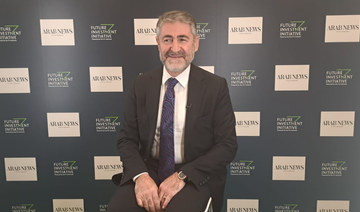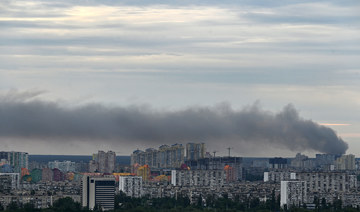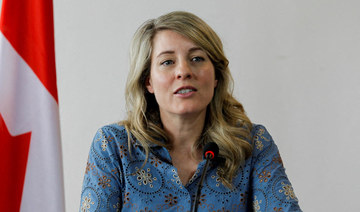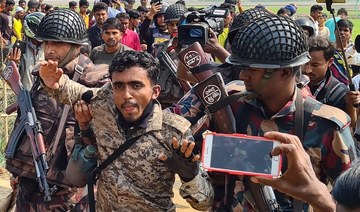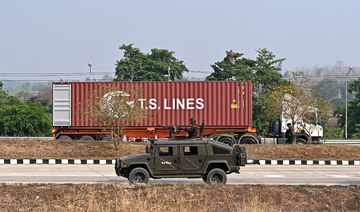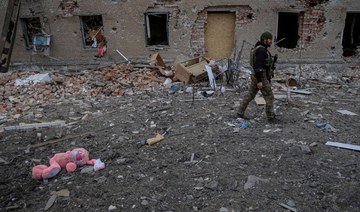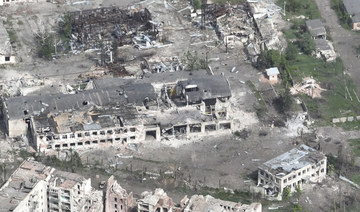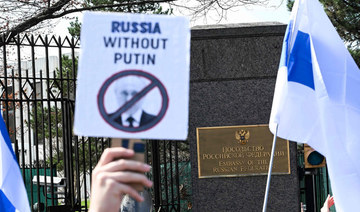KYIV: Ships carrying grain sailed from Ukrainian ports on Monday despite Moscow’s suspension of its participation in a UN program to ensure the safety of such cargoes amid an unrelenting war.
Ukrainian President Volodymyr Zelensky said his country would continue implementing the program, brokered by the United Nations and Turkiye in July and aimed at keeping the supply of food commodities to world markets flowing.
“We understand what we offer the world. We offer stability on the food production market,” Zelensky told a news conference.
But Moscow said it was “unacceptable” for shipping to pass through a Black Sea security corridor as Ukraine was using it to conduct military operations against Russia.
The Russian defense ministry said it could not guarantee security in the area until the Kyiv agreed not to use the route for military purposes — an accusation Ukraine denies.
However, the ministry did not say what Russia would do if ships continued to sail the route. It stressed that Russia was not withdrawing from the deal but only suspending it.
Moscow announced the suspension on Saturday after what it said was a Ukrainian drone attack on its Black Sea fleet.
Meanwhile on the 250th day of a war that has ground on since Russia’s invasion of Ukraine on Feb. 24, Russian missiles rained down across the country. Explosions boomed out in Kyiv, sending black smoke into the sky.
Ukrainian officials said energy infrastructure was hit including at hydro-electric dams, knocking out power, heat and water supplies.
Ukraine’s military said it had shot down 44 of 50 Russian missiles. But strikes left 80 percent of Kyiv without running water, authorities said. Ukrainian police said 13 people were injured in the latest attacks.
“Food must flow”
Still, the resumption of food exports from Ukrainian ports suggested that the prospect of rising world hunger had been averted for now. International officials had feared that Moscow would reimpose a blockade on Ukrainian grain.
Earlier on Monday, Amir Abdullah, the UN official who coordinates the program, said in a Tweet: “Civilian cargo ships can never be a military target or held hostage. The food must flow.”
Shortly afterwards, Ukraine confirmed that 12 ships had set sail. The 354,500 tons of grain they carried was the most in a day since the program began.
Turkish Defense Minister Hulusi Akar, in a phone call with his Russian counterpart Sergei Shoigu, said it was very important for the grain deal to continue, the Turkish defense ministry said.
Missile strikes
Russia’s missile strikes during the Monday morning rush hour repeated a tactic it has pursued this month of targeting Ukrainian civilian infrastructure, especially power stations.
The US ambassador to Kyiv, Bridget Brink, tweeted: “Like millions of Ukrainians, our @USEmbassyKyiv team is once again taking shelter as Russia continues its callous and barbaric missile strikes on the people of Ukraine in an effort to leave the country cold and dark as we approach winter.”
For the past three weeks, Russia has attacked Ukrainian civil infrastructure using expensive long-range missiles and cheap Iranian-made “suicide drones” that fly at a target and detonate.
Ukraine’s Prime Minister Denys Shmyhal said 18 targets, mostly energy infrastructure, were hit in missile and drone strikes on 10 Ukrainian regions on Monday.
In Ukraine’s second largest city, Kharkiv, the strikes had caused a blackout that left trolleybus driver Ihor Polovikov stranded in his electric cable-powered vehicle.
He was fed up, he said, adding: “But nobody will give up just like that. We got used to it, it’s the ninth month. Everyone has understood that this is necessary.”
“Blackmailing the world”
Moscow said it was forced to pull out of the Black Sea grain shipping deal after blaming Kyiv for blasts that damaged Russian navy ships in the Crimean port of Sevastopol on Saturday.
Ukraine has neither confirmed nor denied it was behind the explosions that hit the Crimea base of Russia’s Black Sea Fleet, but says Russia’s navy is a legitimate military target. Moscow said the blasts were caused by a wave of sea and air drones.
After Russia suspended its participation in the grain shipping program, the United States accused Russia of using food as a weapon. President Zelensky said Moscow was “blackmailing the world with hunger.” Russia denies that is its aim.
Kremlin spokesman Dmitry Peskov said the UN-brokered deal was “hardly feasible” since Russia could no longer guarantee the safety of shipping.
Ukraine and Russia are both among the world’s largest exporters of food. For three months, the UN-backed deal has guaranteed Ukrainian exports can reach markets, lifting a Russian de facto blockade. The news that Moscow was pulling out of the deal had sent global wheat prices soaring by more than 5 percent on Monday morning.
The ships that sailed on Monday included one hired by the UN World Food Programme to bring 40,000 tons of grain to drought-hit Africa.
Also on Monday, the Russian Defense Ministry said Moscow had completed the partial military mobilization announced by President Vladimir Putin in September and no further call-up notices would be issued.
Putin announced Russia’s first mobilization since World War Two on Sept. 21, one of a series of escalatory measures in response to Ukrainian gains on the battlefield.
Defense Minister Shoigu said at the time that some 300,000 additional personnel would be drafted. But the mobilization has proceeded chaotically and thousands have fled Russia to avoid being drafted.
Grain ships sail from Ukraine ports as Russian missiles knock out power across country
https://arab.news/mmjpv
Grain ships sail from Ukraine ports as Russian missiles knock out power across country
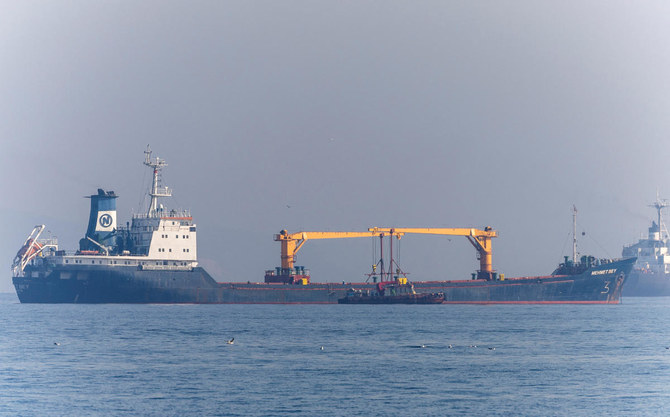
- For the past three weeks, Russia has attacked Ukrainian civil infrastructure using expensive long-range missiles and cheap Iranian-made “suicide drones”
- Shmyhal said 18 targets, mostly energy infrastructure, were hit in missile and drone strikes on 10 Ukrainian regions
Students erect pro-Palestinian encampments across major Canadian universities

- “If public disruption is the only way to get our voice heard, then we are willing to do that,” says University of Toronto protest leader
- Some Jewish groups have accused protesters of being antisemitic, but organizers said some protesters are Jewish
TORONTO: Quebec Premier Francois Legault said on Thursday the encampment at Montreal’s McGill University should be dismantled as more students erected pro-Palestinian camps across some of Canada’s largest universities, demanding they divest from groups with ties to Israel.
The Canadian protests come as police have been arresting hundreds on US campuses and the death toll in Gaza has been mounting.
While McGill had requested police intervention, law enforcement had not stepped in Thursday to clear the encampment and said in a statement Thursday evening it was monitoring the situation.
Students also set up encampments at Canadian schools including the University of Toronto, the University of British Columbia and the University of Ottawa.
“We want the camp to be dismantled. We trust the police, let them do their job,” a spokesperson for Legault said.
There was also a pro-Israel counter-protest in Montreal Thursday. The two sides were kept separate.
On Thursday morning, students at the University of Toronto set up an encampment in a fenced-off grassy space at the school’s downtown campus where some 100 protesters gathered with dozens of tents.
According to a statement from organizers the encampment will stay until the university discloses its investments, divests from any that “sustain Israeli apartheid, occupation and illegal settlement of Palestine” and ends partnerships with some Israeli academic institutions.
Israel says it does not participate in apartheid and that its assault on Gaza does not constitute genocide.
A university spokesperson told Reuters it was “in dialogue with the protesters” and that, as of midday, the encampment was “not disruptive to normal university activities.”
University of Toronto graduate student and encampment spokesperson Sara Rasikh told Reuters they will remain until their demands are met.
“If public disruption is the only way to get our voice heard, then we are willing to do that,” she said.
Some Jewish groups have accused protesters of being antisemitic. Organizers deny that charge, noting that some protesters are Jewish.
Asked to comment on the encampments, Prime Minister Justin Trudeau’s office pointed to a statement he made on Tuesday, saying “Universities are places of learning, they’re places for freedom of expression ... but that only works if people feel safe on campus. Right now ... Jewish students do not feel safe. That’s not right.”
The protests follow the deadly Oct. 7 attack on southern Israel by Hamas militants from the Gaza Strip, which killed 1,200 people and saw dozens taken hostage, and an ensuing Israeli offensive that has killed about 34,000 and created a humanitarian crisis.
India deports Myanmar refugees who fled 2021 coup

- At least 38 refugees were deported on Thursday by the border state of Manipur
- ndia is not a signatory to the1951 UN Refugee Convention and has no law protecting refugees
GUWAHATI, India: India on Thursday deported the first group of Myanmar refugees who had sought shelter after a 2021 military coup, a top state minister said, following weeks of efforts that were hampered by fighting between Myanmar’s rebel forces and the ruling junta.
Thousands of civilians and hundreds of troops from Myanmar have crossed the border to India after the coup. This has worried New Delhi, which has announced plans to fence its border with Myanmar and end a visa-free movement policy.
At least 38 refugees were deported on Thursday by the border state of Manipur, which plans send back a total of 77 people as it copes with sporadic violence that has killed at least 220 people since ethnic clashes broke out in May last year.
“Without any discrimination, we have completed the first phase of deportation of illegal immigrants from Myanmar,” Manipur Chief Minister N. Biren Singh said in a social media post. “The state government is continuing the identification of illegal immigrants.”
One Indian national was also repatriated by Myanmar, Singh added.
New Delhi has not signed the 1951 UN Refugee Convention, which spells out refugee rights and states’ responsibilities to protect them, and it does not have its own laws protecting refugees.
Singh, who is from Prime Minister Narendra Modi’s Bharatiya Janata Party, said in March deportations had begun, but Indian security officials said the efforts were held up by fighting in Myanmar.
Modi is seeking a rare third straight term in ongoing national elections and his government has blamed the refugee influx as one reason for violence that has roiled Manipur.
Britain’s foreign secretary, in Kyiv, promises Ukraine aid for ‘as long as it takes’

- Cameron said Ukraine had a right to use the weapons provided by London to strike targets inside Russia
- 8 children injured in Russian strikes in Kharkiv region amid Cameron's visit
KYIV: British Foreign Secretary David Cameron promised three billion pounds ($3.74 billion) of annual military aid for Ukraine for “as long as it takes” on Thursday, adding that London had no objection to the weapons being used inside Russia.
“We will give three billion pounds every year for as long as is necessary. We’ve just really emptied all we can in terms of giving equipment,” he told Reuters in an interview on a visit to in Kyiv, adding that the aid package was the largest from the UK so far.
“Some of that (equipment) is actually arriving in Ukraine today, while I’m here,” he said.
Cameron said Ukraine had a right to use the weapons provided by London to strike targets inside Russia, and that it was up to Kyiv whether to do so.
“Ukraine has that right. Just as Russia is striking inside Ukraine, you can quite understand why Ukraine feels the need to make sure it’s defending itself,” Cameron told Reuters outside St. Michael’s Cathedral.
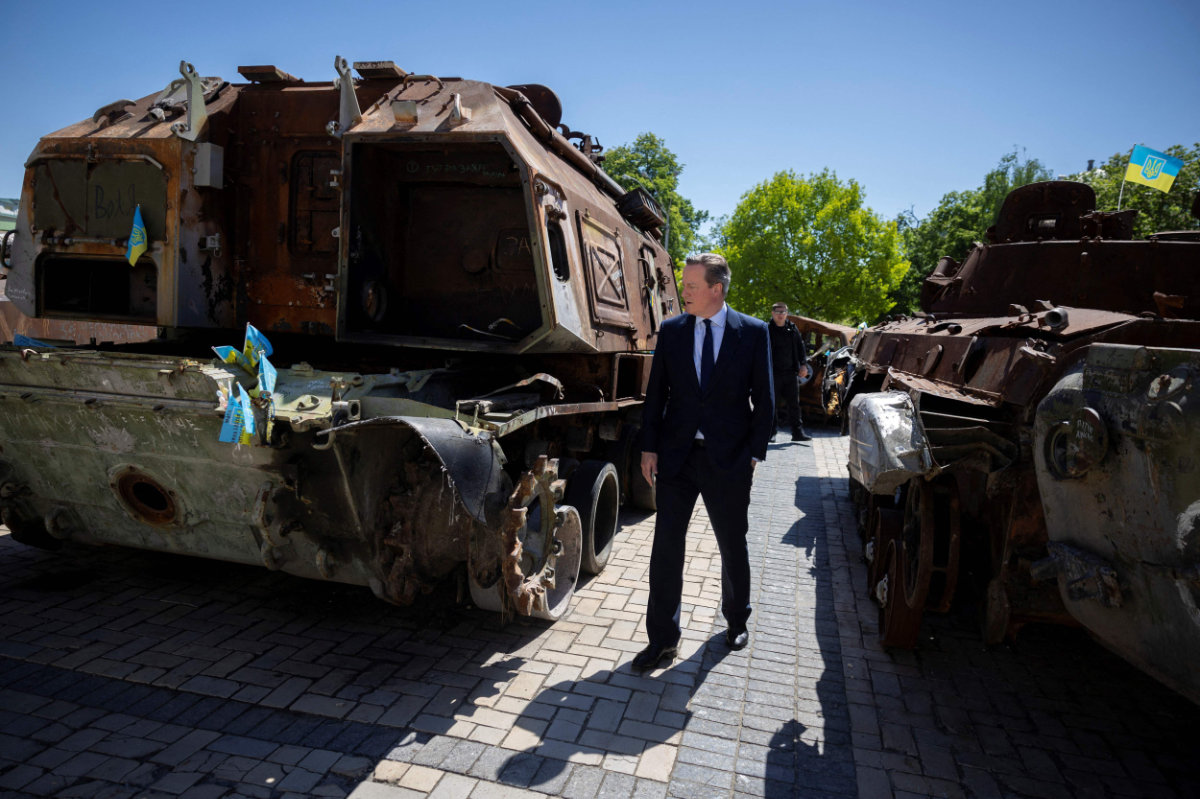
Cameron, who led the UK from 2010 and 2016 as prime minister and only returned to frontline politics several months ago, met Ukraine’s Foreign Minister Dmytro Kuleba and President Volodymyr Zelensky on his second visit to Kyiv as foreign secretary.
Britain’s top diplomat celebrated the release of a long-delayed $60 billion aid package by the US Congress.
“It’s absolutely crucial, not just in terms of the weapons it will bring, but also the boost to morale that it will bring to people here in Ukraine.”
Cameron did not answer directly when asked how he thought the possible re-election of Republican frontrunner Donald Trump to the White House could affect US support for Ukraine.
Trump and hard-line Republicans in Congress oppose further aid to Ukraine, with the possible exception of a loan.
“It’s not for us to decide who the Americans choose as their president — we will work with whoever that is,” Cameron said, adding that the strategy for Ukraine’s allies ought to be to ensure Ukraine is on the front foot by the time of the US elections in November.
Cameron met Ukraine’s FM Dmytro Kuleba and President Volodymyr Zelensky on his second visit to Kyiv as foreign secretary
Britain’s top diplomat celebrated the release of a long-delayed $60 billion aid package by the US Congress.
Russian strike injures 8 children
While Cameron was in Ukraine, Russian guided bombs struck a site close to a sports complex in Ukraine's northeastern Kharkiv region, injuring at least eight children, local officials said.
The town of Derhachi where the incident occurred is a frequent target of Russian aerial strikes. Police said the bombs had landed on premises near the sports centre, sparking fires.
"The air raid siren didn't sound, there was no siren at all," Yana Korobets, head of the sports complex, told Reuters Television.
"I was outside when... I heard a missile fly by. I understood it landed behind our sports complex. It blew out the windows, and because the children are barefoot in our class they suffered cuts in their legs and their hands."
Debris from shattered glass was strewn about the complex. Blood stains were spattered on a wall and on the floor. Outside, the ground was pocked with large craters.
Four of the children suffered moderate injuries and the others minor ones, regional governor Oleh Synehubov said on the Telegram messaging app. An elderly man was also wounded.
"The consequences could have been more tragic," Synehubov told national TV.
Derhachi is near the border with Russia. The Kharkiv region where it is located has long been targeted by Russian attacks but the strikes have become more intense in recent months, hitting civilian and energy infrastructure.
Moscow denies deliberately targeting civilians but thousands have been killed and injured in the war that began with the full-scale invasion of Moscow troops in February 2022.
Russia shipping fuel to North Korea above UN cap, says US
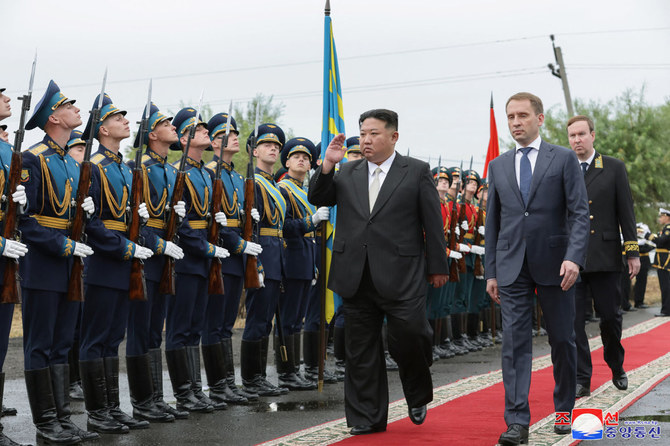
- Under UN sanctions, Pyongyang is limited to importing 500,000 barrels of refined products a year
- Last March, the US and South Korea in March launched a task force aimed at preventing North Korea from procuring illicit oil
WASHINGTON: Russia has been quietly shipping refined petroleum to North Korea at levels that appear to violate a cap imposed by the United Nations Security Council, the White House said on Thursday, with new sanctions to come soon in response.
The disclosure came on the first day after a UN panel of experts monitoring enforcement of longstanding UN sanctions against North Korea for its nuclear weapons and missile programs was disbanded after a Russian veto.
“At the same time that Moscow vetoed the panel’s mandate renewal, Russia has been shipping refined petroleum from Port Vostochny to the DPRK (North Korea),” White House national security spokesperson John Kirby told reporters.
Under UN sanctions, Pyongyang is limited to importing 500,000 barrels of refined products a year. The Russian and North Korean UN missions in New York did not immediately respond to a request for comment on the US accusation.
Kirby said that in March alone, Russia shipped more than 165,000 barrels of refined petroleum to North Korea and that given the close proximity of Russian and North Korean commercial ports, Russia could sustain these shipments indefinitely.
Russia blocked the annual renewal of the UN sanctions monitors in late March in what a US official described as a calculated move by Moscow to hide its own violations of UN Security Council resolutions.
Kirby said the United States will continue to impose sanctions “against those working to facilitate arms and refined petroleum transfers between Russia and the DPRK.” North Korea is formally known as the Democratic People’s Republic of Korea.
“We have previously worked to coordinate autonomous sanctions designations with our partners — including Australia, the European Union, Japan, New Zealand, the Republic of Korea, and the United Kingdom — and we will continue to do so,” he said.
State Department spokesperson Matt Miller said the United States and its allies are working to announce “new coordinated sanctions designations this month.”
The US and South Korea in March launched a task force aimed at preventing North Korea from procuring illicit oil.
The US and others have also accused North Korea of transferring weapons to Russia for use against Ukraine, which it invaded in February 2022. Both Moscow and Pyongyang deny the accusations, but vowed last year to deepen military relations.
The debris from a missile that landed in the Ukrainian city of Kharkiv on Jan. 2 was from a North Korean Hwasong-11 series ballistic missile, UN sanctions monitors told a Security Council committee in a report seen by Reuters on Monday.
Kenya, Tanzania brace for cyclone as heavy rains persist
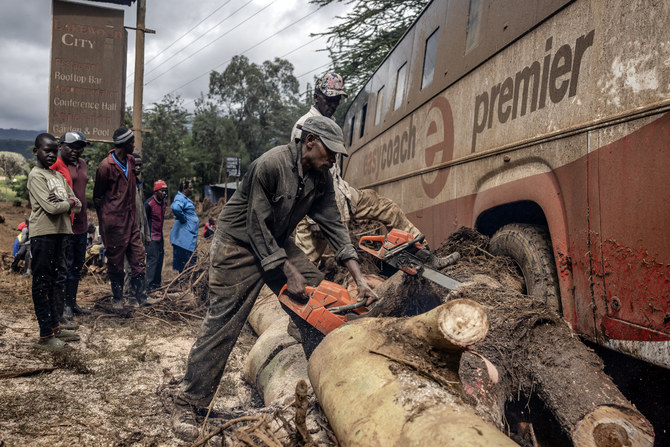
- The two East African neighbors are still recovering from last weeks devastating floods
- Kenya reported about 200 dead while Tanzaia said at least 155 died in floods and landslides
NAIROBI: Kenya and Tanzania were bracing Thursday for a cyclone on the heels of torrential rains that have devastated East Africa, killing more than 350 people and forcing tens of thousands from their homes.
In addition to claiming 188 lives in Kenya since March, the floods have displaced 165,000 people, with 90 reported missing, the interior ministry said, as the government warned citizens to remain on alert.
“Crucially, the coastal region is likely to experience Cyclone Hidaya, which will result in heavy rainfall, large waves and strong winds that could affect marine activities in the Indian Ocean,” the office of Kenyan President William Ruto said.
Neighbouring Tanzania, where at least 155 people have been killed in flooding and landslides, is also expected to feel the force of Hidaya.
“The presence of Hidaya Cyclone... is expected to dominate and affect the weather patterns in the country including heavy rain and strong winds in some Regions near Indian Ocean,” Tanzania Red Cross Society said on X, formerly Twitter.
Kenya’s capital Nairobi is among the areas expected to suffer heavy rains over the next three days, the Kenya Meteorological Department said on X, warning of strong winds and large ocean waves along the country’s coastline.
The forecaster urged residents to be vigilant for flash floods and lightning strikes, adding that strong winds could “blow off roofs, uproot trees” and cause other damage.
The heavier than usual rains have also claimed at least 29 lives in Burundi, with 175 people injured, and tens of thousands displaced since September last year, the United Nations said.
Earlier this week Ruto announced he was deploying Kenya’s military to evacuate everyone living in flood-prone areas.
In a bulletin released Thursday evening, the interior ministry ordered anyone living close to major rivers or near 178 “filled up or near filled up dams or water reservoirs” to vacate the area within 24 hours, warning that they would otherwise face “mandatory evacuation for their safety.”
The devastation has also affected Kenya’s tourism sector — a key economic driver — with some 100 tourists marooned in the famed Maasai Mara wildlife reserve on Wednesday after a river overflowed, flooding lodges and safari camps.
Rescuers later managed to evacuate 90 people by ground and air, the interior ministry said.
The area is currently inaccessible with bridges washed away, Narok West sub-county administrator Stephen Nakola told AFP, adding that about 50 camps in the reserve have been affected, putting more than 500 locals temporarily out of work.
There are no fatalities but communities living around the area have been forced to move away.
“Accessing the Mara is now a nightmare and the people stuck there are really worried, they don’t have an exit route,” Nakola said, adding that waterborne diseases were likely to emerge.
“I am worried that the situation could get worse because the rains are still on.”
In the deadliest single incident in Kenya, dozens of villagers were killed when a dam burst on Monday near Mai Mahiu in the Rift Valley, about 60 kilometers (40 miles) north of Nairobi.
The interior ministry said 52 bodies had been recovered and 51 people were still missing after the dam disaster.
Opposition politicians and lobby groups have accused Ruto’s government of being unprepared and slow to respond to the crisis despite weather warnings.
“Kenya’s government has a human rights obligation to prevent foreseeable harm from climate change and extreme weather events and to protect people when a disaster strikes,” Human Rights Watch said Thursday.
The United States and Britain have issued travel warnings for Kenya, urging their nationals to be cautious amid the extreme weather.
The devastation has sparked an outpouring of condolences and pledges of solidarity from all over the world, including from Pope Francis and UN Secretary General Antonio Guterres.
The rains have been amplified by the El Nino weather pattern — a naturally occurring climate phenomenon typically associated with increased heat worldwide, leading to drought in some parts of the world and heavy downpours elsewhere.



